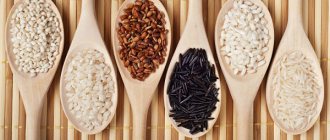coffee "
Diabetes mellitus is one of those diseases that require dietary restrictions and a healthy lifestyle. The question remains: can diabetics have coffee, is there any benefit from it, and which variety is better to choose?
Doctors have different opinions about coffee for diabetes. Some claim that its use reduces the manifestation of the disease, while others claim that it depresses the patient’s condition.
The role of the drink in diabetes
Coffee can be consumed by those who do not have any particular health complaints. You should be careful: abuse of the product can negatively affect the body. Possible disturbances in heart rhythms, sleep disturbances and deterioration in appearance: dull hair and skin, darkening teeth. The release of caffeine from beans into the bloodstream stimulates the production of stress hormones: you may feel coldness in your palms, increased heart rate and sweating. At the same time, this product also has a number of positive qualities. One of the main advantages of such a chronic disease as diabetes is its low calorie content. Naturally, without taking into account additives such as sugar and milk, which soften the taste of the drink. Such additives can cause a sharp jump in blood glucose levels, especially if the milk has a high fat content. In order to protect yourself with the maximum probability from possible negative consequences, you should use the prepared product in its pure form. Also, people suffering from diabetes do not have the opportunity to recharge their brain activity with sweets and simple carbohydrates such as glucose and fructose. In this case, caffeine will come to the rescue. Even in small concentrations, it will increase reaction and improve attention, as well as gather strength.
Possible negative consequences
Excessive consumption of coffee can cause significant harm to health. Considering that most diabetics have a number of concomitant diseases or abnormalities in the functioning of the body, the effects of coffee beans can be negative:
- Load on the heart. The same theophylline that helps free breathing also increases heart rate.
- Increased symptoms of hypertension. With an adrenaline rush provoked by caffeine, blood pressure (BP) levels increase.
- Neuropsychological disorders. Overstimulation of the central nervous system after excessive coffee drinking can cause excessive agitation, irritability, and dysania (sleep disorder).
- Increased blood clotting. Excess caffeine leads to thrombocytosis (increased concentration of platelets in the blood);
- Diuretic effect. The diuretic effect of the drink, if abused, can lead to dehydration (dehydration) of the body.
- Osteoporosis. If you drink unlimited amounts of coffee, it will “wash out” calcium, which leads to the methodical irreversible destruction of bones.
It’s not for nothing that addiction to the drink is called coffee addiction. According to scientific data, caffeine can cause addiction, akin to drugs (addiction). Drinking coffee requires special attention if you have gestational diabetes mellitus.
During the perinatal period, women are advised to minimize the amount of the drink in their diet or eliminate it completely. The negative effects of caffeine can provoke fetoplacental insufficiency, cardiac dysfunction in the expectant mother and child, and nervous overexcitation.
Important! The balance between the positive and negative effects of coffee on the body depends on its dosage. In moderate quantities, grains will not harm the body. Excessive consumption can seriously undermine your health.
Effects on people with type 1 and type 2 diabetes
Most doctors and nutritionists note the positive effect of the drink on the condition of people with both type 1 and type 2 diseases. The fact is that caffeine increases the body's sensitivity to insulin and can temporarily normalize blood glucose levels. In the case of type 1 disease, there is a reduction in the duration of nocturnal hypoglycemia by almost three times - from 130 minutes to 50. However, it should be remembered that the reaction of each organism is individual and unpredictable. Regardless of the type of disease, coffee should be consumed with caution in cases of cardiovascular diseases, as it will create additional stress on the cardiac system. If you still want to protect yourself from possible negative effects on the body, then make your choice in favor of caffeine-free beans. In general, moderate and infrequent consumption of such an invigorating product is acceptable for both types of diabetes.
The effect of coffee on the body in diabetes
Coffee and diabetes are compatible. Thanks to its rich composition, the drink benefits the body, strengthens the heart and blood vessels, and has a general tonic effect. In diabetes, its influence lies in the following factors:
- Antioxidants that are part of coffee protect cells from the harmful effects of free radicals and prevent the destruction of their membranes. They also prevent the processes of premature aging of the body and the growth of tumors.
- Linoleic acid has a positive effect on the cardiovascular system. Thanks to this substance, the risk of heart attacks and strokes is significantly reduced.
- In a diabetic's body, the drink helps cells absorb insulin, which can reduce the level of symptoms.
Coffee has only positive effects for diabetes. However, you should not abuse this drink either, especially if you have high blood pressure. It is also necessary to choose a quality product. It is better to purchase whole grains and grind them yourself - this way you can make sure that the product is natural and free of impurities.
Soluble or natural
During the production of freeze-dried granules, many of the taste and aroma properties of fresh grains are lost. To make the drink look like freshly brewed, during the production of granules, artificial flavors and taste enhancers are added to it. You should not expect any benefit from such a product; on the contrary, regular use of artificial additives can be harmful, especially to an organism already weakened by a chronic disease.
Thus, when choosing a flavored drink, you should opt for natural options and high-quality fresh beans. Make sure that all grains are whole, have no chips and have a uniform, uniform color. Naturally, the final benefit and harm is determined by the volume consumed; you should also avoid extraneous additives and at the same time monitor your blood pressure and blood glucose levels.
Natural coffe
Natural coffee with a familiar color is also beneficial for diabetics. The main mechanism of its effect is also the breakdown of fats, normalization of fat metabolism and weight loss. A well-designed diet is aimed at maintaining body weight within normal limits, and coffee allows you to control weight. A stable weight is not able to cure a patient from an already diagnosed disease, but it prevents further development of the disease.
It is recommended to drink 1-2 cups of coffee drink per day. It is undesirable to exceed the permissible limit, since there is a risk of developing allergic reactions and increasing blood pressure. In addition, with regular intake of increased doses of the drink, loss of sensitivity to chlorogenic acid may occur.
Coffee Recipes for Diabetics
In case of such a chronic disease, it is recommended to drink freshly brewed coffee from natural beans. The most gentle and mild option is beans purified from the active substance caffeine or green coffee - such beans have not been subjected to heat treatment, and drinks based on them have the mildest taste. There are also alternatives to an invigorating drink with a similar taste: chicory, cocoa, Jerusalem artichoke drink.
Jerusalem artichoke coffee
When purchasing fresh Jerusalem artichoke fruits, you need to prepare them before preparing a hot drink.
Ingredients:
- 30 grams of dried Jerusalem artichoke fruits
- A teaspoon of Royal Forest Jerusalem artichoke syrup
- 250 ml water
Cooking steps:
- Grind the required amount of fruit. To do this, cut them with a knife or chop them on a coarse grater.
- Dry the crushed fruits. It is best to do this outdoors or in the sun.
- Fry the dried fruits in a dry frying pan.
- Immediately before preparing a hot drink, grind the dried and roasted fruits in a coffee grinder.
- Place the crushed fruits in a pot and fill with water.
- Cook the drink over low heat until lightly boiling, about 5-7 minutes.
- Add a small amount of Jerusalem artichoke syrup to the finished slightly cooled drink for a sweeter taste.
Cold mochaccino in French
Ingredients:
- 250 ml water
- A teaspoon of ground coffee
- 100 ml skim milk
- 2 tbsp. l. Royal Forest cocoa powder
- crushed ice
Cooking steps:
- Place the ground grains in a Turk and fill with water.
- Simmer the drink over low heat for about 3 minutes.
- Add cocoa powder to the Turk, continue to cook the drink until ready, about 4 minutes.
- Pour the hot drink into a glass, let it cool, add milk and ice.
Instant coffee powder
Instant coffee is harmful not only for diabetes, but also for a healthy person. In the process of preparing high-quality raw materials, whole grains are roasted and placed in a special apparatus. Here they are sprayed into a fine powder, which is left in this form or treated with hot steam to obtain granules. All useful ingredients are lost with this cooking method.
The only thing you can add to coffee if you have diabetes is sugar substitutes.
This powder contains large quantities of flavorings and coffee oil, which compensate for the lack of taste and smell. In addition, many manufacturers may add various impurities to instant coffee that are not indicated on the packaging.
Synthetic biology and genes
Synthetic biology is often described as “a blend of engineering design and biology.” Recent developments in this direction have allowed scientists to create artificial genes for medical and biological purposes.
Artificial genes reprogram cells. As a result, they begin to use their internal mechanisms in new ways.
One use of such genes is to create “molecular switches.” With their help, it is possible to control immune cells for more targeted and safe cancer treatment.
When developing such genes, scientists encounter a lot of difficulties. Among them is the need to choose such a mechanism of activation so that the gene cannot be activated accidentally, and its reaction is limited and does not harm the person.
Caffeine and peptide production
In the report, scientists talk about "completely artificial caffeine receptors." The same substance that is found in abundance in a regular cup of coffee.
Special proteins located on the surface of cells act as receptors. They react when they come into contact with caffeine molecules, just like a lock reacts with a matching key. The interaction between the receptor and the molecule triggers a special process inside the cell.
At this point, caffeine triggers the cell to produce “synthetic human glucagon-like peptide 1,” a compound that is used to lower glucose levels in type 2 diabetes.
According to the study authors, the gene responsible for the production of the substance is called “caffeine-activated advanced regulator” (or C-STAR in the original). C-STAR was tested by injection into living cells. The scientists then tracked the level of cell response to different sources and dosages of caffeine obtained from drinks and products from different brands. The cells were also transplanted into mice with type 2 diabetes.
Benefits of tea
Black, green and oolong teas contain polyphenols, molecules that scientists believe may improve insulin sensitivity, prevent the development of inflammatory diseases, and also have anti-carcinogenic properties. This applies to all types of drink, but green tea is still considered healthier. It contains higher levels of polyphenols because it is made from unfermented leaves.
Black tea, on the other hand, is made entirely from fermented plants, which deprives it of some of its beneficial properties. In addition, some types of black tea contain 2-3 times more caffeine, which can negatively affect your health.
Results
Diabetes and coffee are quite compatible concepts. With persistent compensation of the disease, the drink can be consumed twice a day. You should choose coffee beans for your daily menu and prepare the drink yourself, taking into account diabetic recommendations, the main ones of which are:
- use of spices;
- drinking not too strong coffee;
- eliminating sugar during cooking (stevia is the best replacement);
- refusal of coffee after 18 hours with unstable glycemia, with elevated blood pressure, in a state of anxiety (nervousness).
Absolute contraindications are decompensation of diabetes, hypertension, tachycardia (and other heart diseases), dysania, vascular complications, and stomach ulcers.
Therapy and habit as one
According to scientists, caffeine is one of the most successful options for a substance that activates the peptide production mechanism. It is non-toxic, inexpensive, and only found in certain drinks.
Among other things, the report notes that treatments using synthetic genes that respond to common foods without the use of special chemicals can be tailored to each patient individually.
By combining therapy with habit, the researchers indicate that this approach will make patients more willing to adhere to a treatment regimen. In conclusion they say:
“By focusing on daily habits, this type of treatment can be seamlessly integrated into each person's lifestyle. This will usher in a new era of personalized medicine.”










